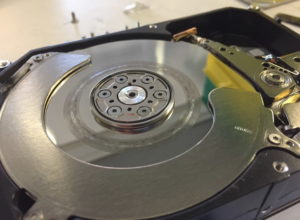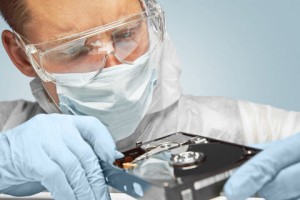Can you freeze a broken hard drive to restore it to a functional condition and recover the data?
No, you cannot — at least, not anymore. The “freezer trick” was one of the first data recovery methods to hit the mainstream, and in the late 1990s, it was a viable (but potentially dangerous) data recovery technique.
In 2023, freezing a hard drive will not work. Period. To understand why, let’s look at the history of the infamous freezer trick.
Freezing a hard drive addressed a specific type of hardware failure
Early hard drives were prone to an issue called stiction (static friction), which occurs when the platters stop spinning due to a lack of lubrication. If the platters can’t move, the read/write heads can’t access the magnetic signals that make up your data.
In the early days, the “freezer trick” consisted of a few simple steps:
- The hard drive was placed into an airtight bag, which prevents moisture from accumulating on the electronics board or any other components.
- The hard drive was placed into a freezer for several hours.
- The cold temperatures shrink the physical components, freeing the stuck platters and allowing them to spin.
- The hard drive was connected to a computer and quickly cloned.
Unfortunately, this technique is not viable for modern hard drives — and even if you have a hard drive from the 1990s, the freezer trick is not a safe option compared with professional data recovery techniques.
So, why doesn’t this work anymore? For starters:
- Stiction still occurs, but it’s much less common than in the 1990s. Hard drive manufacturers have used a variety of techniques to address this issue.
- Hard drive areal density (the amount of data per unit of physical space on each platter) is much higher for modern hard drives. A slight misalignment of the actuator head assembly — which could easily occur when freezing a hard drive — may prevent the read/write heads from accessing data.
- On modern hard drives, data recovery usually requires some work with the drive’s firmware (the onboard operating instructions). Freezing a hard drive could theoretically address a physical issue, but popping your drive in your freezer certainly won’t alter its firmware.
“But a friend of mine tried the freezer trick, and he recovered all of his data!”
When we tell our clients about the potential dangers of the freezer trick, we inevitably hear a few “success stories.”

A hard drive with severely damaged platters.
But remember, anecdotes are not scientific evidence. In a small number of cases, simply turning a hard drive off for several hours will temporarily fix minor physical issues, at which point you can boot it and recover the data; no freezer needed. We believe that most successful applications of the freezer trick would have had the same result if the user simply turned off their computer for a few hours.
And while you’ll find plenty of stories online singing the praises of the freezer trick, people won’t tell those stories when the trick doesn’t work. In other words, there’s a heavy degree of confirmation bias to consider.
We encourage some healthy skepticism. If the freezer trick worked, every data recovery company would have industrial-grade freezers onsite — but you won’t find those appliances at any of our full-service laboratories.
A Safe, Risk-Free Solution for Hard Drive Data Recovery
Datarecovery.com has been a world leader in professional data recovery since the 1990s. Over the past decades, we’ve poured millions of dollars into research and development.
We strongly discourage the use of the freezer trick, but we understand the appeal. After all, professional data recovery services can be expensive — but if your data is irreplaceable, do-it-yourself data recovery may ultimately cost more. In some cases, certain techniques (including the freezer trick) may cause permanent data loss.
We’ve built our services to limit risks for consumers and businesses. We provide free evaluations and support our services with a no data, no charge guarantee: If we’re unable to recover the files you need, you don’t pay for the attempt.
If you’re dealing with data loss, we’re here to help. Schedule an evaluation online or call 1-800-237-4200 to speak with a data recovery expert.






